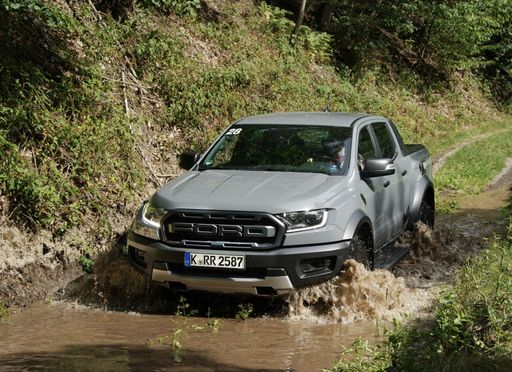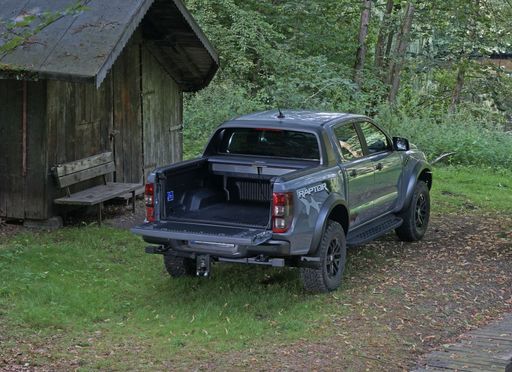Ford Ranger VS Toyota Yaris – Specs, Efficiency & Price Comparison
Which model is the better choice – the Ford Ranger or the Toyota Yaris? We compare performance (292 HP vs 280 HP), boot capacity ( vs 286 L), efficiency (3.10 L vs 3.80 L), and of course, the price (34500 £ vs 21900 £).
Find out now which car fits your needs better!
The Ford Ranger (Pickup) is powered by a Diesel, Petrol or Plugin Hybrid engine and comes with a Manuel or Automatic transmission. In comparison, the Toyota Yaris (Hatchback) features a Full Hybrid or Petrol engine and a Automatic or Manuel gearbox.
When it comes to boot capacity, the Ford Ranger offers , while the Toyota Yaris provides 286 L – depending on what matters most to you. If you’re looking for more power, you’ll need to decide whether the 292 HP of the Ford Ranger or the 280 HP of the Toyota Yaris suits your needs better.
There are also differences in efficiency: 3.10 L vs 3.80 L. In terms of price, the Ford Ranger starts at 34500 £, while the Toyota Yaris is available from 21900 £.
Compare all the key specs now and find out which model fits your lifestyle best!
Ford Ranger
The Ford Ranger stands out in the pickup market with its robust build and versatile capabilities, making it a popular choice for both work and leisure. Its modern design is complemented by a well-equipped interior, providing comfort and advanced technology. Whether tackling challenging terrains or cruising through the city, the Ranger delivers a reliable and dynamic driving experience.
details @ media.ford.com
@ media.ford.com
 @ media.ford.com
@ media.ford.com
Toyota Yaris
The Toyota Yaris exudes a charming blend of practicality and style, making it an appealing choice for urban drivers. Its compact design allows for easy manoeuvrability in crowded city streets, while the interior offers a surprisingly spacious and comfortable environment. With a focus on fuel efficiency and reliability, the Yaris remains a popular option for those seeking a balance between performance and economy.
details @ Toyota
@ Toyota
 @ Toyota
@ Toyota

|

|
|
|
|
Costs and Consumption |
|
|---|---|
|
Price
34500 - 68800 £
|
Price
21900 - 45000 £
|
|
Consumption L/100km
3.1 - 13.8 L
|
Consumption L/100km
3.8 - 9.5 L
|
|
Consumption kWh/100km
-
|
Consumption kWh/100km
-
|
|
Electric Range
50 km
|
Electric Range
-
|
|
Battery Capacity
11.80 kWh
|
Battery Capacity
-
|
|
co2
70 - 315 g/km
|
co2
87 - 215 g/km
|
|
Fuel tank capacity
80 L
|
Fuel tank capacity
36 - 50 L
|
Dimensions and Body |
|
|---|---|
|
Body Type
Pickup
|
Body Type
Hatchback
|
|
Seats
2 - 5
|
Seats
4 - 5
|
|
Doors
2 - 4
|
Doors
3 - 5
|
|
Curb weight
2082 - 2486 kg
|
Curb weight
1090 - 1356 kg
|
|
Trunk capacity
-
|
Trunk capacity
141 - 286 L
|
|
Length
5370 - 5420 mm
|
Length
3940 - 3995 mm
|
|
Width
1918 - 1968 mm
|
Width
1745 - 1805 mm
|
|
Height
1868 - 1922 mm
|
Height
1455 - 1500 mm
|
|
Payload
676 - 1108 kg
|
Payload
289 - 525 kg
|
Engine and Performance |
|
|---|---|
|
Engine Type
Diesel, Petrol, Plugin Hybrid
|
Engine Type
Full Hybrid, Petrol
|
|
Transmission
Manuel, Automatic
|
Transmission
Automatic, Manuel
|
|
Transmission Detail
Schaltgetriebe, Automatikgetriebe
|
Transmission Detail
Schaltgetriebe, Automatikgetriebe
|
|
Drive Type
All-Wheel Drive
|
Drive Type
Front-Wheel Drive, All-Wheel Drive
|
|
Power HP
170 - 292 HP
|
Power HP
116 - 280 HP
|
|
Acceleration 0-100km/h
7.9 - 12.1 s
|
Acceleration 0-100km/h
5.5 - 9.7 s
|
|
Max Speed
180 - 190 km/h
|
Max Speed
175 - 230 km/h
|
|
Torque
405 - 697 Nm
|
Torque
390 Nm
|
|
Number of Cylinders
4 - 6
|
Number of Cylinders
3
|
|
Power kW
125 - 215 kW
|
Power kW
85 - 206 kW
|
|
Engine capacity
1996 - 2993 cm3
|
Engine capacity
1490 - 1618 cm3
|
General |
|
|---|---|
|
Model Year
2022 - 2025
|
Model Year
2024 - 2025
|
|
CO2 Efficiency Class
G, B
|
CO2 Efficiency Class
B, G
|
|
Brand
Ford
|
Brand
Toyota
|
Ford Ranger
A Comprehensive Look at the Ford Ranger: Versatility Meets Innovation
The Ford Ranger has long been a staple in the world of pick-up trucks, renowned for its robust design and versatility. Whether for rugged off-road adventures or everyday utility tasks, the Ford Ranger continues to be a frontrunner in the pick-up segment. In this article, we explore the technical details and innovative features that set the latest versions of the Ford Ranger apart from its competitors.
Powertrain Performance: A Range of Choices
The Ford Ranger offers a selection of powerful engines, catering to a diverse set of user requirements. Engine options range from the fuel-efficient 2.0-litre EcoBlue diesel engine to the robust 3.0-litre EcoBoost petrol engine, offering impressive outputs from 170 to 292 PS. These engines are paired with either a manual or an advanced automatic transmission, both providing smooth shifting and optimised performance across various driving conditions.
The Ranger’s all-wheel-drive system ensures a robust off-road capability while maintaining a composed ride on urban roads. With torque figures ranging between 405 Nm and 600 Nm, the Ranger guarantees ample pulling power whether you're on or off the beaten track.
Fuel Efficiency and Environmental Considerations
Recognising the importance of balancing performance with efficiency, the Ford Ranger delivers competitive fuel consumption figures ranging from 8.4 to 13.8 litres per 100 km. Despite its robust performance capabilities, the Ranger remains mindful of its environmental footprint, maintaining a functional balance between power and efficiency with a CO2 efficiency class of G.
Advanced Safety and Technology Features
Incorporating cutting-edge technology, the Ford Ranger is equipped with a suite of safety features designed to protect both passengers and payload. Among these are adaptive cruise control, lane-keeping assistance, and a pre-collision assist system, enhancing the driver's ability to navigate both rural roads and busy motorways safely and efficiently.
Moreover, the interior tech suite includes an intuitive infotainment system, complete with connectivity options for seamless integration of smartphones and smart devices. This ensures drivers and passengers can stay connected and entertained on all journeys.
Customisation and Comfort
The Ford Ranger offers a variety of trim levels, allowing customers to tailor the vehicle to their specific needs. From the rugged XL 4x4 to the luxurious Platinum e-4WD Automatik, there is a model to suit every preference and requirement. Equipment lines such as Wildtrak and MS-RT add enhanced styling and additional features for those seeking a more distinctive and upscale appearance.
Inside, the Ranger provides comfortable seating configurations for up to five passengers, with premium materials and ample storage space to ensure every journey is a pleasant experience. Users can also benefit from a range of comfort features, including climate control, premium audio systems, and adjustable seating.
Practicality Meets Payload
The Ford Ranger excels in practicality with its impressive payload capacity and spacious cargo bed, suitable for carrying everything from work equipment to recreational gear. With a maximum payload of up to 1,108 kg, the Ranger is more than capable of handling heavy loads, making it an ideal choice for both professional and personal use.
Additionally, the robust chassis and durable build quality provide long-lasting performance even under the most demanding conditions, ensuring reliability and endurance in the long term.
Conclusion: A Resilient Companion for All Terrains
With its capable engine choices, outstanding off-road capabilities, and a host of advanced features, the Ford Ranger continues to lead the way in the pick-up truck category. Whether for practical utility, adventurous pursuits, or simply as a reliable daily vehicle, the Ranger delivers on all fronts – a true testament to Ford’s commitment to innovation and quality in the automotive industry.
Toyota Yaris
Introducing the Next-Gen Toyota Yaris: A Blend of Innovation and Technology
The Toyota Yaris has long been lauded for its efficiency, reliability, and practicality. As we venture into the 2024 model year, Toyota has upped the ante with the latest versions of this popular hatchback, melding cutting-edge technology with eco-conscious design. Here’s an in-depth look at what makes the current Yaris line-up stand out from the crowd.
Efficient Powertrains: Hybrid and Beyond
Spearheading the technological innovation in the Yaris range is the introduction of various hybrid models. The Yaris offers a 1.5-litre full-hybrid engine, marrying a petrol engine with an electric motor to produce between 116 and 130 PS. This power blend is controlled via a sophisticated CVT-gearbox, optimizing both performance and fuel efficiency, with consumption figures ranging from an impressive 3.8 to 4.2 litres per 100 km.
For those seeking pure performance, the GR Yaris variants provide a turbocharged 1.6-litre engine capable of producing 280 PS. This power is delivered via a choice of manual or automatic transmission, giving drivers the tactile involvement or convenience they desire.
Design that Fulfils and Inspires
The Yaris hasn't forgotten its roots as a compact, city-friendly hatchback, measuring between 3,940 and 3,995 mm in length. With its bold front grille, sleek lines, and a choice of striking colours, it's a car that turns heads while remaining perfectly suited for urban environments.
The interior is equally impressive, designed with a focus on driver convenience and comfort. Depending on the variant, Yaris can offer generous cargo space of up to 286 litres, making it a perfect companion for everyday tasks or weekend escapes.
Technological Integration: The Smart Choice
Toyota's approach goes beyond just improving engine technology; the Yaris is packed with innovative features aimed at enhancing the driving experience. It boasts a suite of advanced safety systems such as lane departure alert, pre-collision system, and adaptive cruise control, ensuring peace of mind on the road.
The infotainment system in the Yaris is designed to keep you connected, offering seamless smartphone integration, a user-friendly interface, and an intuitive navigation system, ensuring that you're always informed and entertained.
The Cost of Innovation
Owning a Yaris is not just about impressive technology; it's also about making economic sense. With a price range between €25,500 and €49,990, and monthly costs spanning from €748 to €1,513, it offers a broad spectrum to suit different budget needs.
Concerned about emissions? You can rest easy knowing that the Yaris boasts a CO2 efficiency class ranging from B to G, thanks to its low emissions output of between 87 to 215 g/km.
Conclusion: The Toyota Yaris Drives the Future
The Toyota Yaris continues to be a strong contender in the compact car segment, pushing boundaries with its innovative full-hybrid systems and performance-oriented GR models. It's a remarkable blend of design, technology, and economy, ensuring it remains a top choice for drivers who demand more from their hatchbacks.
Whether you're seeking the efficiency of a hybrid or the thrill of the GR Yaris, there's a model tailored to your unique driving needs in Toyota's latest Yaris lineup.
The prices and data displayed are estimates based on German list prices and may vary by country. This information is not legally binding.
